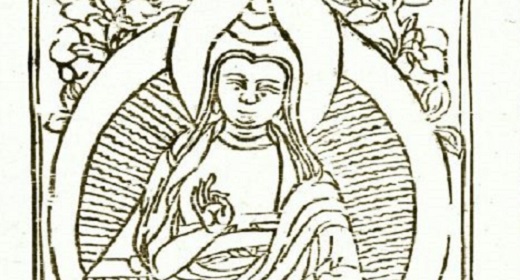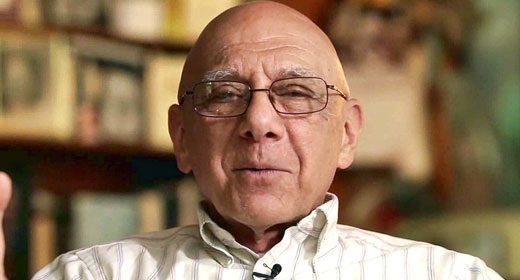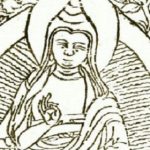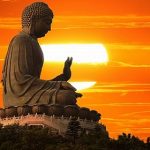Awaken: I want to start by thanking you for sharing your time with us today. I know our readers will appreciate your words and wisdom as much as I do.
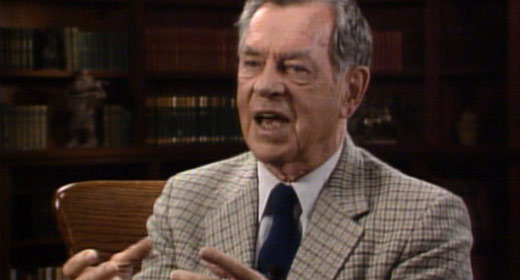 You are known for your work on the significance of myth in different cultures. While some people dismiss the idea of myth as nothing but fanciful stories, or made-up historical anecdotes… their role in our lives is palpable, isn’t it?
You are known for your work on the significance of myth in different cultures. While some people dismiss the idea of myth as nothing but fanciful stories, or made-up historical anecdotes… their role in our lives is palpable, isn’t it?
Joseph Campbell: Myth is not the same as history; myths are not inspiring stories of people who lived notable lives. No, myth is the transcendent in relationship to the present.
Awaken: Could you elaborate… especially on the meaning of transcendent and on how myths serve to bring us there?
Joseph Campbell: What myth does for you is to point beyond the phenomenal field toward the transcendent. A mythic figure is like the compass that you used to draw circles and arcs in school, with one leg in the field of time, and the other in the eternal. The image of God may look like a human or animal form, but its reference is transcendent of that.
Awaken: Is it necessary to use myth in order to reach the transcendent?
Joseph Campbell: Of course, in trying to relate yourself to transcendence, you don’t have to have images. You can go the Zen way, and forget the myths altogether. But I’m talking about the mythic way. And what the myth does is to provide a field in which you can locate your self. That’s the sense of the Mandala, the secret Circle, whether you are a Tibetan monk or the patient of a Jungian analyst.
Awaken: To go even further, in getting to know your work through the years, I have seen you embrace myth for its capacity to support us in realizing not only our potential as humans, but also our health, both physically and psychologically. Could you elaborate on this, as well?
Joseph Campbell: I’ve lately gotten to know the work of a splendid psychiatrist in Germany, named Karlfried Graf Durckheim. This psychiatrist has summarized the whole problem of health — psychological and physical — with reference to myth, continuing the work of Carl Gustav Jung and Erich Neumann. There lives in us, says Durckheim, a life wisdom. We are all manifestations of a mystic Power: the power of life, which has shaped all life, and which has shaped us all in our mother’s womb. And this kind of wisdom lives in us, and it represents the force of this power, this energy, pouring into the field of time and space. But it’s a transcendent energy. It’s an energy that comes from a realm beyond our powers of knowledge. And that energy becomes bound in each of us — in this body — to a certain commitment.
Awaken: You are saying that normally, we do not easily access this energetic flow?
Joseph Campbell: No, the mind that thinks, the eyes that see, they can become so involved in concepts and the local, temporal tasks, that we become bound up and don’t let this energy flow through. And then we become sick. The energy is blocked, and we are thrown off center; this idea is very similar to the tenets of traditional Chinese and Indian medicine.
So the psychological problem, the way to keep from becoming blocked, is to make yourself — and here is the phrase — transparent to the transcendent. It’s as easy as that.
Awaken: When you speak of the transcendent, do you mean God?
Joseph Campbell: A mythic figure has one leg in the transcendent. And one of the problems with the popularization of religious ideas is that the God becomes a final fact, and is no longer itself transparent to the transcendent. This is what Lao-Tzu means when he says, in the first aphorism of the Tao-te Ching, “The Tao that can be named is not the Tao.”
Make your god transparent to the transcendent, and it doesn’t matter what his name is.
Now, when you have a deity as your model, your life becomes transparent to the transcendent, so far as you realize the inspiration of that god. This means living, not in the name of success, or achievement in the world, but rather than the name of transcendence, letting the energy come through.
Awaken: Can you explain more about how myth relates to the divine flow of energy you were speaking of?
Joseph Campbell: There is a doctrine that comes out of the Vedantic tradition that has helped me to understand the nature of the energy that flows through myths. The Taittiriya Upanishad speaks of five sheaths that enclose the atman, which is the spiritual ground or germ of the individual.
The first sheath is called annamaya-kosa, the food sheath. That is your body, which is made out of food, and which will become food when you die. The worms, the vultures, the hyenas, or the flame will consume it. This is the sheath of our physical body: the food sheath.
The second sheath is called the sheath of breath, pranayama-kosa. The breath oxidizes the food; the breath turns it into life. That’s the thing, this body: food on fire.
The next sheath is called the mental sheath, manomaya-kosa. This is the consciousness of the body, and it coordinates the senses with the you that thinks it is you.
Then there is a big gap.
And the next sheath is called the wisdom sheath, vijnanamaya-kosa. This is the sheath of the wisdom of the transcendent pouring in. This is the wisdom that brought you to form in the mother womb, that digests your dinners, that knows how to do it. This is the wisdom that, when you cut yourself, knows how to heal the wound. The cut bleeds, and then a scab comes along; finally, a scar forms, and this is the wisdom sheath going to work.
You go for a walk in the woods. Somebody has built a barbed wire fence. It leans right into the tree. The tree incorporates that barbed wire. The tree has it, the wisdom sheath. This is the level of your nature wisdom that you share with the hills, with the trees, with the fish, with the animals. The power of myth is to put the mental sheath in touch with this wisdom sheath, which is the one that speaks of the transcendent.
And the sheath in word of the wisdom sheath is the sheath of bliss, anandamaya-kosa, which is a kernel of that transcendence in and of itself. Life is a manifestation of bliss.
Awaken: I would almost venture to say that we, as “seekers” endeavor to become more like that tree that continues to grow, despite the barbed wire… able to just move with the challenges of life and keep on going… It is like becoming the Tao, in which no effort is our own.
Joseph Campbell: Just think: the grass grows. Out of the bliss sheath comes the wisdom sheath, and the grass grows. Then, every two weeks, someone comes along with the lawnmower and cuts the grass down. Suppose the grass were just to think, Ah, shucks, what’s all this fuss about? I quit?
That’s mental sheath stuff. You know that impulse: life is painful; how could a good god create a world with all of this in it? That is thinking in terms of good and evil, light and dark — pairs of opposites. The wisdom sheath doesn’t know about pairs of opposite. The bliss sheath contains all opposites. The wisdom sheath is just coming right up out of it, and it turns into pairs of opposites later on.
Awaken: It seems like most of humanity is stuck in the level of the body… the food sheath? Has it ever really been different?
Joseph Campbell: The Egyptians made the enormous error of mistaking eternal life for the eternal concretized life of the body…
When I was in Egypt, I went to the miserable Little tomb of Tutankhamen. Think about the coffin of Tutankhamen in terms of the Indian image of the sheaths. I don’t know if that is what the Egyptian sculptors intended, but this is what I saw.
You have three quadrangular boxes, one inside the other: food sheath, breath sheath, and mental sheath. That’s on the outside. Then you have a great stone coffin that separates the inner two sheaths from the ones on the outside. And what do you have inside? You have a sarcophagus made of wood, inlaid with gold and lapis lazuli. This is shaped in the form of the young king, with his signs of kingship crossed over his chest. That, I would say, is the wisdom sheath, the level of the living organic form.
And within that is the sheath of bliss: a solid gold coffin in the form of Tutankhamen, with several tons of gold. When you realize how gold was mined in those days, the sarcophagus cost many life, and lots of suffering to get that much gold. And this was the sheath of bliss.
And within this, of course, was the atman, the body itself.
Awaken: I see… Mistaking eternal life for the temporary life of the body.
Joseph Campbell: The Egyptians based all of this — building the pyramids, and these great tombs — on this basic mistake, that eternal life is the life of annamaya-kosa, the food sheath. It has nothing to do with any such thing. Eternity has nothing to do with time. Time is what shuts you out from eternity. Eternity is now. It is the transcendent dimension of the now to which myth refers.
Awaken: So, what you are saying is that the role of myth helps to bridge the gap between this level of reality, governed by time and duality, and the transcendent dimension, which is beyond time and has no suitable language around it?
Joseph Campbell: The Rolling Stone gathers no moss. Myth is moss.
Awaken: Yet skeptics would like to do away with myth, for not capturing reality accurately…
Joseph Campbell: When people say, “Well, you know, this couldn’t have happened, and that couldn’t have happened, and so let’s get rid of the myths,” what they are doing, is getting rid of the vocabulary of discourse between manomaya-kosa and vijnamaya-kosa, between mental wisdom and organic, life-body wisdom.
These deities in myths service models, give you life roles, so long as you understand the reference to the foot in the transcendent. The Christian idea of Imitatio Christi, the imitation of Christ — what does that mean, that you should go out and get yourself crucified? Nothing of the kind. It means to live with one foot in the transcendent, as God.
Awaken: And I’ve always felt that all of the wisdom traditions point to this same truth… although they’re wrapped up in different packages…
Joseph Campbell: As Paul says, “I live; yet not I, but Christ liveth in me.” That means that the eternal thing works in me. And this is the meaning of the Buddha consciousness, the consciousness that is both the entire universe and you yourself.
Awaken: You have also become known for encouraging your students to “follow their bliss.” In as simple terms as possible, what does that mean?
Joseph Campbell: Doing what you absolutely must do to be yourself.
Awaken: And what exactly do you mean by “bliss?”
Joseph Campbell: That deep sense of being present. If you can, hang onto that, you are on the edge of the transcendent already. You may not have any money, but it doesn’t matter.
Your bliss can guide you to that transcendent mystery, because bliss is the welling up of the energy of the transcendent wisdom… So when the bliss cuts off, you know that you’ve cut off the welling up; try to find it again.
Awaken: We talk about the “transcendent mystery,” and it’s almost best to leave it at that, because words like “God”just fall short, don’t they?
Joseph Campbell: When you simply translate God into a psychological function or factor, you have gone as far as God, and no further. The limits of psychology are the same as the limits of theology. They have to do with the problem of symbolization, not with the transcendence, and they go the same distance… as long as you have a God, you’re stuck. Recall Meister Eckhart: “The ultimate leave-taking is the leaving of God for God.”
Awaken: In other words, we have to get out of the concept of God in order to get into the wordless experience of the transcendent?
Joseph Campbell: It’s a shame we have only one word for the two concepts. In India, there are several — jiva, Atman, Brahman— and they are all different. “God,” our one word, is a really inadequate word. It always implies a personification, and unless One says “Goddess,” it implies a male personification. Our limited vocabulary is what binds us, what ties us up.
Awaken: The limitations in language reflect our limitations of experience…
Joseph Campbell: Monotheism is a concretization of God, a mystery that actually transcends concretization, and the concretization of the mystery savior in Jesus is equivalent. So, God is concretized, the savior is concretized, the end of the world is concretized, and Christianity loses its metaphoric perspective. If you read the historical “facts” as metaphors, however, then you will discover in Christianity a marvelous array of psychologically valid symbols that are fundamentally okay until they’re concretized.
Awaken: You are saying that to think of these metaphors as concrete and literal, is a bit of an immature approach?
Joseph Campbell: Concretization is alright for teaching little children, who don’t understand metaphor. Matters such as these, they tend to take concretely. What has to happen at a certain point, if one wants development, is that these childhood concretizations have to be opened up. You can’t get rid of them, because symbols that are taken concretely are put right into you. They are internalized and can’t just be dismissed. They have to be reread. I know.
Awaken: Because you were raised with all of that, right?
Joseph Campbell: Until I was twenty five years old, I took Christianity concretely. And I must say, I’m grateful for having been exposed to such rich symbolism.
Yet there’s also some great strength to be gained by giving up that religion, by going beyond it.
I mean, if you really do. If you just “drop out,” that’s something else. But if you think it through — if you learn to read the symbols as metaphors, instead of accepting them as the facts they’re purported to be — if you know, in other words, why you are out, then it can be a source of great strength. But when you do break out, you then have to set up your own sacred field.
Awaken: Do you mean a “sacred space,” and if so, what would that resemble?
Joseph Campbell: A sacred space is any space that is set apart from the usual context of life. In the secular context, it is concerned with pairs of opposites: cause-and-effect, gain and loss, and so on. Sacred space has no function in the way of earning a living or a reputation. Practical use is not the dominant feature of anything in the space. You do not have anything in your sacred space that’s not of significance to you for the harmonization of your own life. In your sacred space, things are working in terms of your dynamic — and not anybody else’s.
Your sacred space is where you can find yourself again and again.
You really don’t have a sacred space, a rescue land, until you find somewhere to be, that’s not a wasteland, some field of action, where there is a spring of ambrosia — a joy that comes from inside, not something external that puts joy into you — a place that lets you experience your own will and your own intention, and your own wish so that, in small, the kingdom is there. I think everybody, whether they know it or not, is in need of such a place.
Awaken: Following our bliss, and finding a sacred space to call our own… It really is so simple!
Joseph Campbell: Sacred space and sacred time, and something joyous to do is all we need. Almost anything then, becomes a continuous and increasing joy.
What you have to do, you do with play. I think a good way to conceive of sacred space is as a playground. If what you’re doing, seems like play, you are in it.
Awaken: It’s hard for us to play, as we grow older, because we’ve been so conditioned to achieve…
Joseph Campbell: One great thing about growing old is that nothing is going to lead to anything. Everything is of the moment.
Awaken: This reminds me of something I learned from reading Alan Watts… To look at life as a dance, which is to say, to drop the idea of “getting somewhere.”
Joseph Campbell: I recall a wonderful talk I had with Alan Watts, who was a marvelous man.
Awaken: I would love to hear of any anecdotes you care to share about Alan Watts!
Joseph Campbell: One of my problems was that Jean (my wife) was always late. I’d make an appointment to meet her somewhere or other, and there I’d sit waiting for half an hour. I found it’s a normal thing for men to wait for women. They have so many things they have to do before they can walk out of the house, that a half an hour or more goes by quickly.
Now, it’s a basic rule in New York that it takes a half hour to get anywhere, but Jean always thought that the time when she was supposed to be somewhere was the time to leave. So I had this long wait problem, and I said to Alan, “What can I do about this? I get aggravated, and when she arrives, I’m a little bit nasty.”
Alan said, “Well, your problem is that you want her to be there, and you’re wishing for a situation that is not the one you are in. Just realize that you are ruining the experience that you could be having there while waiting, by thinking it should be otherwise.”
So then, waiting for Jean became a spiritual exercise. I said to myself, “You should not be thinking that Jean should be here. Look around you and see what is going on.” And, you know, the place where I was became so goddamn interesting that I wasn’t bored at all. Often times, I hoped that Jean would make me wait a little longer. That would’ve seemed impossible to me, until Alan suggested shutting out any thought that my situation should’ve been otherwise.
Awaken: Such a simple lesson… just being happy where we are!
Joseph Campbell: That’s an example of what fear and desire do. I desired the situation to be the one we planned, and that desire forbade me, my immediate experience: “This is it! This is Life! Look at it! Isn’t it bubbling?”
Awaken: Dropping desires… the heart of Buddha’s four noble truths… it was Alan Watts who awakened my own interest in these things…
Joseph Campbell: The big lesson in Buddhism then, the sense of what we have been saying is, “Get away from your rational system, and get into the wonderful experience that is moving through all things all the time.“
It is through living that we experience and communicate the spirit. It is through life that we learn to live in the spirit. One in full quest of the spirit knows that the goal of life is death.
Awaken: You mentioned Jean… You have an impressive 49 years of marriage behind you, and I feel like I would be remiss if I didn’t ask you… what is the secret? In our last moments together, would you offer some words of wisdom about love and marriage?
Joseph Campbell: When I was a student in Germany, an old German professor said that the way to choose a wife is to look at her mother. If the mother is a good woman, and the kind that you regard as ideal, then marry anyone of her daughters, and she will shape a life for you.
In marriage, the woman is the initiator, and the man rides along.
The idea of the wife being the one that shapes a life for you is one that I took to heart, and it’s a good idea. The woman is the energy, the shakti, of life. The male must learn to ride on that energy and not dictate the life. I’m certain of that. He is the vehicle of the woman’s energy. That’s what he is. When the male won’t disintegrate, you do not have a marriage. You have a living-together, perhaps, for practical or erotic reasons, but a marriage requires the dissolution of the male initiative… there must be a disintegration of ego for the two to combine.
Awaken: There has to be a kind of self-sacrifice?
Joseph Campbell: In marriage, you are not sacrificing yourself to the other person. You are sacrificing yourself to the relationship.
That’s the problem with getting married. You must ask yourself, “can I open myself to compassion?” Not to lust, but to compassion.
Awaken: What is compassion to you?
Joseph Campbell: Compassion for me is just what the word says: It is “suffering with.” It is an immediate participation in the suffering of another to such a degree that you forget yourself and your own safety and spontaneously do what’s necessary.
Awaken: You have to soften yourself…
Joseph Campbell: The medieval idea of the gentle heart is very much a part of this. If what you’ve been calling love is really lust, that is a state alright: one that can die. Love doesn’t die.
For the gentle heart, marriage must first be spiritual, then comes physical consummation.
It’s hard to talk about anything as sensitive as this, but that term “gentle heart” to me, is a clue to what love is. The idea of the gentle heart involves a sense of responsibility to the person. If that is not there, you have not got love, you’ve got some thing else. If that is there, it will last. Lust doesn’t, no responsibility there.
What I see in marriage, then, is a real identification with that other person as your responsibility, and as the one whom you love. Committing yourself to anyone, turning your destiny over to a dual destiny, is a life commitment. To lose your sense of responsibility to the person who has given you that commitment, because something comes along, that enables you to think, “I’d like to fly off in this direction, and forget that which has already been committed“ — this is not marriage. I do not think you are married unless your relationship to your spouse has primary consideration in your life. It’s got to be top.
Awaken: On that note, I will thank you for spending this time with us, Mr. Campbell. It truly has been a delight and we are grateful.
This is one of Awaken’s Dream Interviews, conducted by Donna Quesada, and All Answers are Verbatim from Joseph Campbell.


